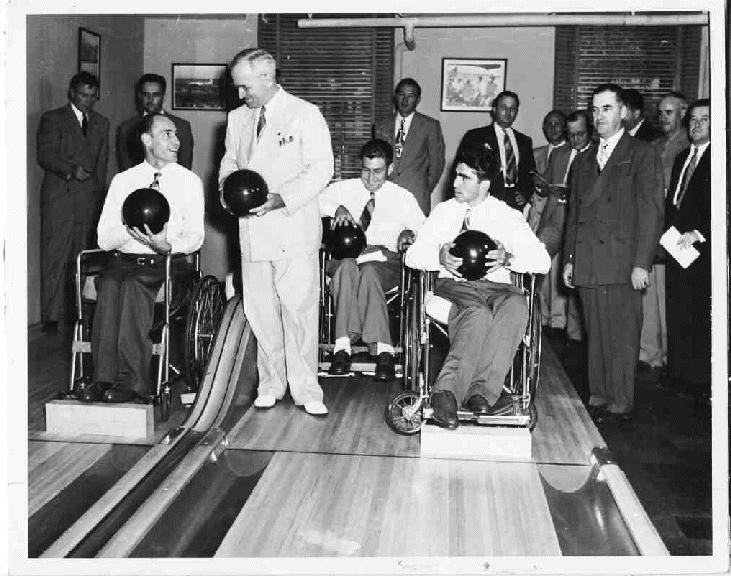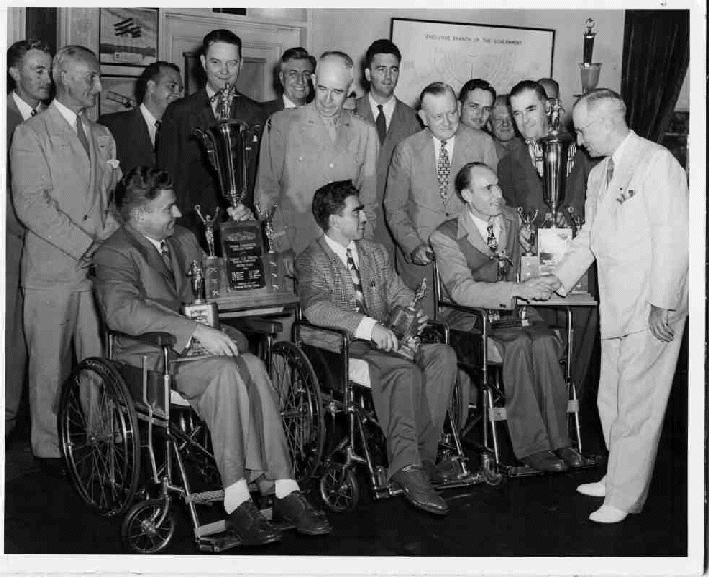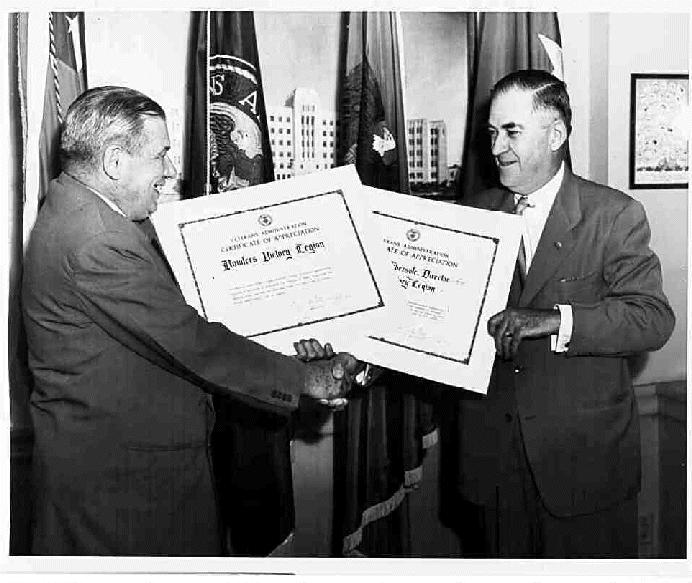|
"My Dinner with Bernie"
by Jeffrey A. Mansfield
[ archives
page | timeline index: 1 | 2 | 3 | 4 | compilation | bibliography | transcript | pictures ]
An interview with Dr. Bernath Eugene Phillips (PH.D. Physical Education, Penn
State 1941) American Association of Health, Physical Education, and
Recreation's Recreational Therapy Section Editor from 1952 to 1958;
Recreation Specialist, Special Service, Department of Medicine and
Surgery, Veterans Adminiastration; Chairman of the Conference Steering
Committee and Conference Report Editor, 1957 Conference on Recreation
for the Mentally Ill; and the first Hospital Recreation Director registered
by the Council for the Advancement of Hospital Recreation.
Jeff Mansfield:
Who started recreational threrapy?
Dr. Bernath Eugene Phillips: I think in this book (Recreation
for the Mentally Ill, November 17-20, 1957 Conference Report, edited
by Phillips, and published by the American Association for Health,
Physical Education, and Recreation-AAHPER in 1958) you will find it
says that the three professional organizations really started recreational
therapy; the Hospital Section of the American Recreation Society (ARS-HS
formed 1948), backed by Dr. Clifford C. Bream, Jr., I don't know whether
Cliff's still alive, probably not because he was older than I was
[note: At the time of this interview, Bernie was 85, and Cliff, in
his 90's was alive and well.], the Recreational Therapy Section of
the AAHPER (AAHPER-RTS formed 1952), of which I was the editor and
author of the monthly column from 1952 to 1958, and the National Association
of Recreational Therapists (NART formed 1953). The National Recreation
Association (NRA) also began a hospital recreation consulting service
in 1953. However, it was a service rather than a professional group.
J: So they formed CAHR the Council for the Advancement of Hospital
Recreation?
B: Yeah, well here (the book) it tells you who the council
was, if I can find it, I think you might want to spend a lot of time
with this.
J: OK, so there were two members from the ARS-HS, and two from
the AAHPER's Recreational Therapy Section, and two from NART, plus
one hospital consultant from the NRA.
B: Two members each, that's right, they would have been appointed
positions, they would have held them for a year or two years and may
have been reappointed.
J: The CAHR was founded in November 1953, after the American
Recreation Society created the Hospital Section in 1948.
B: Yes, the ARS-Hospital Section was before my Recreational
Therapy Section. I believe that was three or four years before, and
then NART came after.
J: I saw references to the representatives going to Washington,
I imagine C. C. Bream, Jr. ...
B: Yeah C. C. was in charge of all recreation service in the
VA central office in Washnigton, as time went on I was subordinate
to Bream, he was in charge of recreation and I was in charge of adaptive
sports when they combined the sports division and the athletics division
both under recreation.
J: You had written, "The objectives were to assist the
doctor in getting his patients well and to make life as satisfying
and meaningful as possible for those patients who must remain in the
hospital" that is very similar to the objectives of the Council
for the Advancement of Hospital Recreation.
B: I think they were all very similar.
J: Were the people on the council working in hospitals?
B: Not all, I think Jack Anderson (AAHPER Director) was on
the council. Each of us appointed two, but I don't know that any of
them were particularly hospital people.
J: How did recreational therapy begin?
B: Recreation for the ill was suggested at the Conference for
the American Association of Health, Physical Education, and Recration,
and money was appropriated to do a study of recreation for the ill
and handicapped. We decided that it would be just too voluminous,
impossible to study all the illnesses, so we confined it to the mentally
ill and the handicapped, but even then we had everybody there, each
of the directors were leaders. There were one hundred and seventeen
people. All of them are listed on the back page. [of the book]
J: Is there any one person who stands out in your mind as the
person who developed recreational therapy? Perhaps Dr. John Eisele
Davis or somebody like that?
B: That's a good question but I don't know if I can answer
it, because there were two or three. Now Davis preceded me in the
profession, if you want to call it that, but I don't know, you see
nobody heard too much about John, he was a recreational therapist
at Perry Point and did some writing, how well it was recognized I'm
not certain. I think that strictly for psychiatric patients, John
did very well. I don't know how I would answer that question, Jeff.
I would like to, but I can't.
J: So, if there wasn't a particular person, do you think there
was a particular event that promoted recreational therapy as a profession
rather than just an adjuvant treatment used by other allied health
professions?
B: I think that probably its impetus, really from what I hear
nowadays, was in WWII. Of course, being at Walter Reed General Hospital,
we were advanced in almost everything we did. Maybe not too far but,
... we had wards of paraplegics all in striker frames on ward, and
we started wheelchair basketball. In all honesty I think that probably
my sports technician -- if I can recall probably Eckland (?) -- at
Los Angeles/San Fernando, he really probably started wheelchair basketball.
And, of course that stuff, we were on Time magazine with the wheelchair
basketball.
J: And that would have been about 1946?
B: Yeah, 1945 perhaps. I don't know how you pick all these
things up so far back. You see wheelchair basketball, and bowling,
for example. I do have some photographs in there of some of wheelchair
bowlers on the White House alleys. The Bowlers Victory Legion (BVL)
was one of the first outfits that I got associated with when I went
to Washington. During the war, the VA they had done things, I don't
know exactly how to state it but, anyway we used the BVL and they
bought our trophies and started a bowling tournament among all VA
hospitals. It started in 1946. You see, over thirty years from '47
to '77, in that time they had contributed more than 7 mil to the VA.
The first BVL tournament was held in 1947 and seven of the 31 VA hospitals
were entered. A. B. Ebersole deserves the credit. He carried the BVL
with his wife and secretary for years. Actually, there was a guy by
the name of Jim Pixley who was always a civilian. He had diabetes.
He was in charge at the time; so they had me come in to replace him
in Washington in '46
J: So, Pixley was in charge in '45 and them you took over?
B: Yeah, Pixley was. In those days it was called the Athletic
Service (AS). The AS in those days consisted of Library Service, Canteen,
chaplaincy, and three or four more.
J: Did General Omar Bradley start the VA Special Services?
B: Yes, General Bradley was the first VA administrator, and
Carl R. Gray, Jr. was second. I remember him (Gray) because in 1951-2,
I went to Berlin with the state department as coordinator of recreation
and sports specialist. He would always ask me to tell him about Berlin.
J: Bradley then created the positions, and paved the way for
the payment of people as recreational therapists or hospital recreation
specialists?
B: Now you see this was set up by General Kerr who at the time
was assistant administrator ... you had canteen and so forth. That's
when all these jobs were set out really.
J: So General Kerr actually set up the special services initially
then?
B: That isn't to mean in your old VA. Before 1946 you had the
veterans administration nobody wanted to go to. It was Bradley who
really created the new set up; with Gen. Hawley the chief medical
director, and Kerr.
J: When you were starting with hospital recreation, were they
referring to the treatment as recreational therapy?
B: Depends on where you were. I should correct something I
think. Technically, I think could never say really, although I had
some of these recreation assignments, it wasn't my primary interest
which was first physical education--adaptive sports particularly--because
recreation includes so many things, like music and art and literature
and all. I was interested primarily in the sports aspect, except when
I got with the AAHPER just for a month as a recreational therapist.
Although for those six years from 52 to 58, I covered the field of
recreational therapy as thoroughly as I could.
J: The use of the title, did CAHR issue cards or certificates
with recreational therapy on them or was it hospital recreation?
B: There were three titles, Hospital Recreation Director, Leader,
and Aide.
J: When did the debate between recreational therapy and therapeutic
recreation begin? It was mentioned in your March 1956 column, and
didn't you open with that as the main topic of discussion at the 1957
conference?
B: Back in 1945 Dr. Paul Haun and I would sit around in the
evenings debating the pros and cons of what to call the profession.
Yes, Paul would have called it recreation therapy. I think that some
of the people who want to be closer to the medics want to call it
therapeutic recreation. You know, how are you going to determine if
a motion picture is therapeutic or not. It just doesn't make any sense.
Now I can't remember how or why we got into discussions like that,
but we spent a lot of time talking about it. One thing that I want
to call to your attention in the back pages [of the book] since it
was not possible to get it into the conference as much as we wanted
to, here Paul Haun, "Hospital Recreation, A Medical Viewpoint"
Appendix E that was one of his better papers I think, and he told
you the difference there of how he conceived of recreation and recreation
therapy. He also led one of our discussion groups. Paul was also very
complimentary of the profession at the Atlantic City 40th National
Recreation Congress.
J: You know, they still haven't resolved it, it's still controversial.
B: I don't believe it.
J: So, it started out as recreational therapy, then they wanted
to be seen as more clinically orientated, for respect, so they called
it therapeutic recreation?
B: Yes, so instead of getting a GS9 you'd get a GS10. [VA pay
scale]
J: Now, because they don't consider the field of therapeutic
recreation to be as clinically based they've gone back to using recreational
therapy as the more clinical term, saying that recreational therapy
is defined as an adjunctive treatment.
B: Well, I think recreational therapy really is probably more
to the point because therapeutic recreation, anything can be therapeutic
or not therapeutic and what's therapeutic mean?
J: Peterson & Gunn developed the tripartite theory. It's
essentially a spectrum where you have recreational therapy on one
end, as the more clinical aspect of it, then you have leisure counseling
and leisure education in the middle, and then adaptive sports and
adaptive recreation at the other end. They refer to therapeutic recreation
as the entire spectrum with recreation therapy being at the clinical
end.
B: You see recreation can be so all inclusive it can be everything,
and I never knew quite where to draw the limits.
J: I found one of your comments in your column most intriguing,
"Can we agree ... that a person needs recreation whether or not
he is in the hospital ... that he needs recreation as he needs food,
exercise, rest, faith and shelter ... that those deficient in recreation,
whether in account or kind, must be prescribed recreation just as
those deficient in certain foods must be prescribed diets ... that
further, there are many in the hospital with no recreation deficiency
who nevertheless, need recreation just as there are those with no
diet deficiency who must eat." (JHPER 27:5:52)
B: You say I wrote that? That's pretty good. Let me see it.
J: When they started the hospital recreation program, how well
accepted were you by the other allied health professionals? Did you
feel like you had their respect?
B: When you say other, do you mean just in recreation?
J: I mean the occupational therapists, physical therapists,
people in rehabilitation ...
B: I don't know that I could answer that because you're going
to have interlacing, competition, but I think that most of the top
people recognize, you know they couldn't really argue with me, I had
a PH.D. degree. You never know whether you're accepted or you're not
accepted. I never gave any thought to that. As you say there is still
an argument about therapeutic recreation versus recreational therapy,
so there must be something to the argument.
J: When you started registering the hospital recreation professionals,
was it to protect the public, to make sure that they were well qualified
personnel, for the safety of the public, or was it a need for recognition?
B: You know I hate to answer that , but I think its probably
the latter. When I say recognition, it was always assumed that you
were doing something for the public, but then whether you say we can
compete with corrective, there's no reason why we ever had both really.
Dr. John Davis got into pushing corrective therapy. The primary thing
he knew was recreation for the mentally ill for the people he had
over there at Perry Point.
J: What about occupational therapy?
B: We had occupational therapy and physical therapy during
WWII, and if they had both been built up to what was necessary, I
don't think you'd ever have any of these other therapies, because
occupational and physical therapy take care of just about everything.
What happened you see is there was nobody to do the job, so they got
all these physical education majors who knew as much if not more about
it than they did, and that's what happened, when recreation people
came in and knew much more about it.
J: So, there was a great need because of the war and the VA
couldn't get enough certified OT's and PT's?
B: Oh yeah, we had wards and wards of paralyzed vets and a
schools full of amputees.
J: Did you work more with adapted sports than with the mentally
ill?
B: Well I can't say that because I used to go to these state
psychiatric hospitals and lecture every year and most of our people
were from mental hospitals. Adaptive sports was more specific, if
I had been a therapist at a local level I could answer your question
a lot easier than being director of the program. As director of the
program you try to facilitate their doing the best job that they can.
J: Did you have a vision in mind when you started as director
of the program and during that period of time that you were in there
did you see it going in that direction?
B: That's kind of a difficult question, whether the vision
comes first or the action comes first, I never gave it much thought.
You see in those days if there was any problem with where you were
going it's whether you're going to be recreational therapy or therapeutic
recreation. Adaptive sports was more limited and recreation oriented.
I just wanted the therapists to be the best they could be. I wasn't
trying to push one particular thing.
B: Marty Meyer from Newark University he was on my staff, he's
been for the last 20 years or so the Associate Director of Mental
Hygiene for the state of Indiana, and here's Paul Haun in the center
here, of course I was on the right here, and there's Cecil Morgan
who was at Springfield College ..., and there's Cliff Bream (Chief,
Recreation Division, Special Services, Department of Medicine and
Surgery, VA WA) here, Ed Kelly back there, he was in charge of motion
pictures for the VA.

B: Here's Ebersole who started it (BVL) on the right, and I'm
back there in the corner.


B: Here's Bradley and Gus Mason, Howard Rusk, Hawley , Ebersole,
Harry Truman, and the three winners.

B: Gray (Carl R. Gray Jr. on the left) is giving the BVL Director
A.L. Ebersole (on th right) a VA Certificate of Appreciation back
in 1952.
|